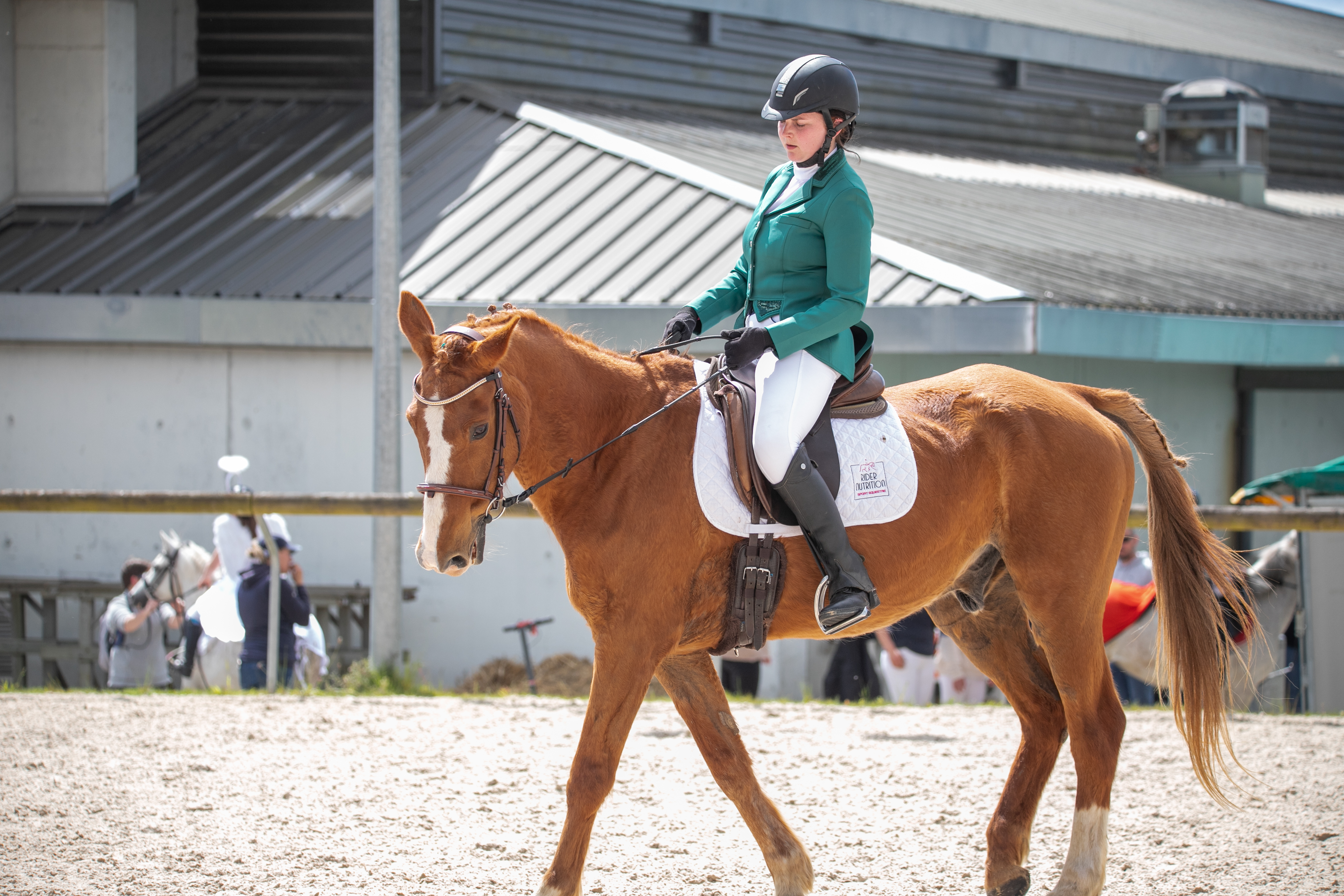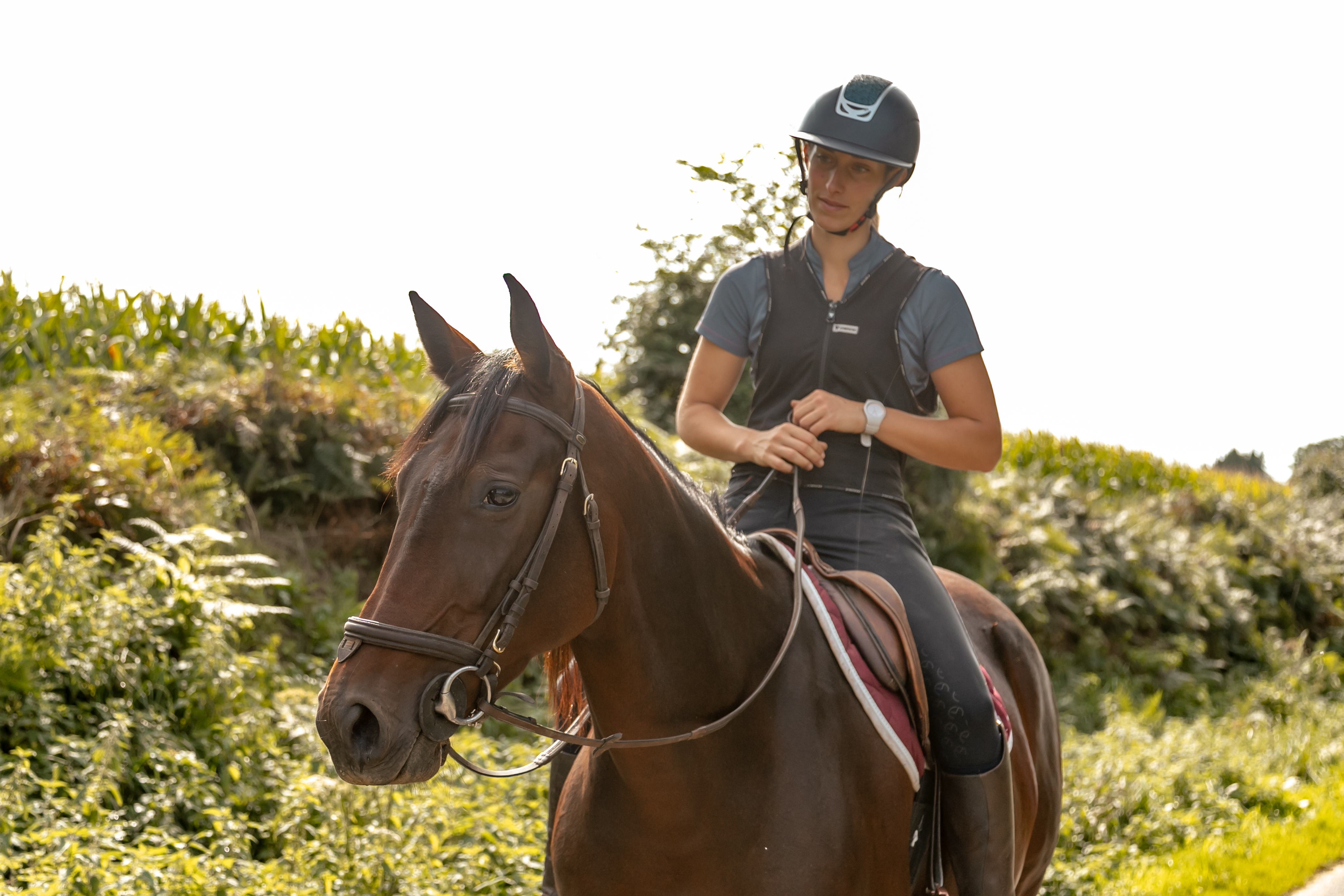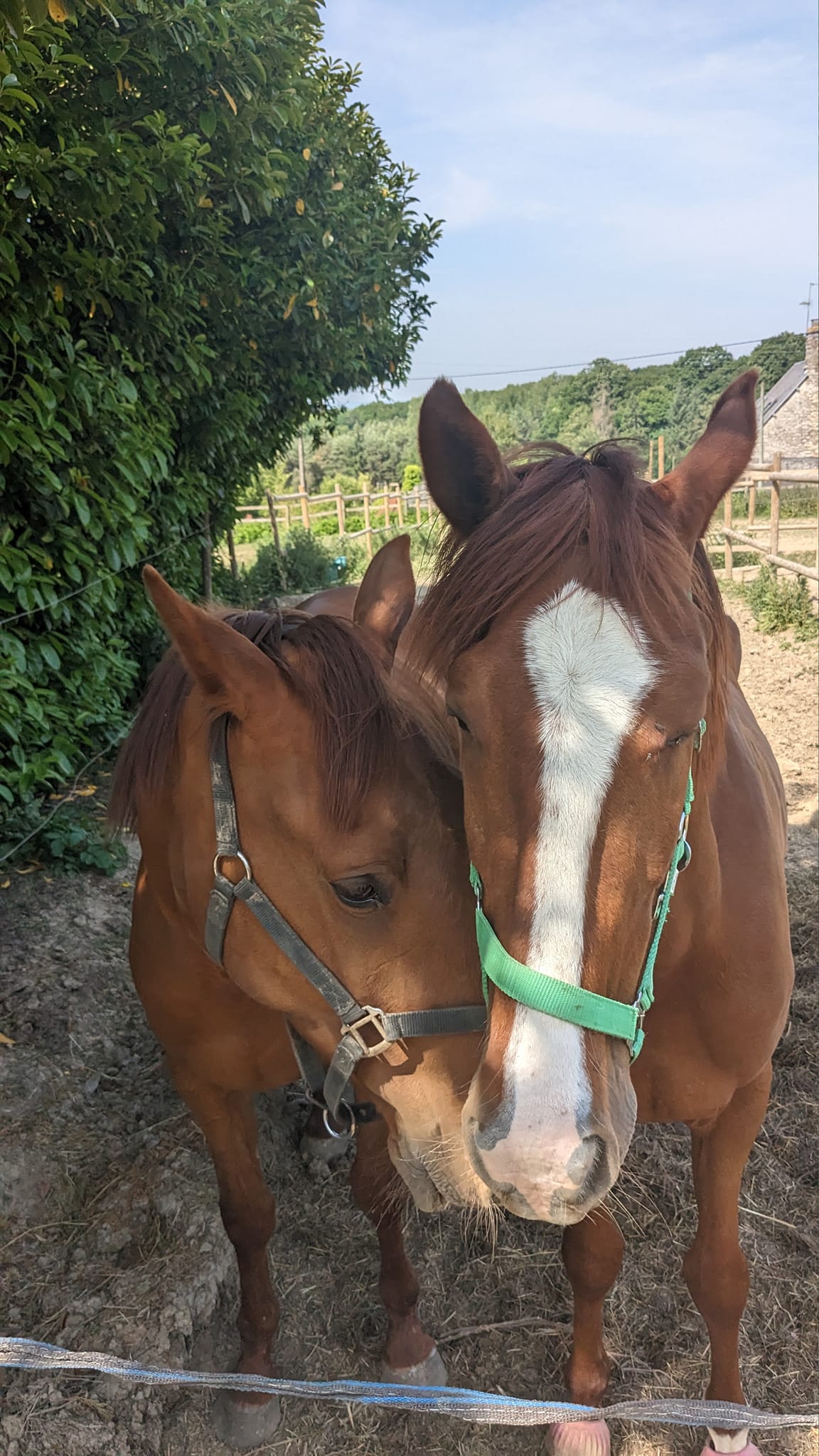Your basket is currently empty!
Category: Living in Normandy
Living in Normandy is a dream come true. Rural French lifestyle, filled with horses, beaches and rosé. Come explore with me as I navigate life in Normandy as a lost millenial.

Keeping Horses in France: Competitions
You’ve made the move, registered the horses, and now want to join in the competitions. Welcome to the next installment in my series of Keeping Horses in France. If you haven’t been keeping up, check out my last post here: A guide to keeping horses in France.
This post mainly talks about Showjumping, Dressage, and Eventing, as they are the disciplines I am most familiar with in France.

License to Ride
To ride legally in France, you need to show that you are medically viable. This comes in the form of a license, it is the same for all physical activities and sports. The basic French Equestrian Federation (FFE) license for an adult costs 36€ per year and includes basic insurance for the rider. The license also enables you to have insurance if you are riding someone else’s horses.However, if you wish to compete you must pay an extra fee through your club, and upload a medical certificate via your FFE account.
If you are disabled and want to ride, you need to contact FFE directly to obtain the forms for para-riding. To be able to be recognised and/or take part in para-dressage events, you must apply for classification. For club level 3/2 events you can request simplified classification, for events from club 1 onwards you must request national classification.
Types of Competitions
France is fast growing to be a leader in the horse world when it comes to competition and development. See below the types of competitions below.

The Competition System
Club competitions are open to all riders with a valid competition license provided they have the required minimum number of galops.
Minimum number of gallops
Lower Levels: Club 4, Club 3: gallop 2
Club 2: gallop 3
Club 1: gallop 4
Elite Club: Gallop 6
CSO Obstacle height
Lower Level: Club 4 : 65 cm
Club 3 : 75 cm
Club 2 : 85 cm
Higher Level: Club 1 : 95 cm
Club Elite : 105 cm
Cross Obstacle height
Club 3: H: 60cm?W: 70cm River: 100cm Bank: 70cm + 1 combinaison
Club 2: H: 80cm W: 90cm River: 120cm + 2 combinaisons
Club 1: H: 90cm W: 100cm River: 150cm + 3 combinaisons
ClubElite: H: 90cm W:100cm River: 150cm + 3 combinaisonsCourse technicality
Lower Level: Club 3 and 4: only one combination per course, no river.
Club 2: one or two combinations per course, no river.
Higher Level: Club 1: two to three combinations per course as well as a barred river.
Elite club: two to three combinations per course as well as a river of 3 meters.Dressage tests
Find a comprehensive list of tests here.Purebred or Non-Purebred?
As?mentioned in part of the registration process, you will need to declare if your horse is purebred or not. This will impact what competitions you can enter.
For Purebred horses, or Plein Papier (PP) there is no limit to what you can enter.
Mixed horses, either partially or fully known as Origin constaté (OC), or Origin Non-Constaté (ONC), are limited to Club level competitions only
What to wear?
Dressage
In the regulations, you must wear a show jacket, and a white or light-colored shirt with a closed collar and cuffs. Jodphurs should be white or off-white, with boots. Chaps are allowed with ankle boots. Gloves are optional but recommended. For the Club division, the regulations mention free, correct, and appropriate riding attire under the responsibility of the participating club. A helmet is obligatory and must be approved according to the standards in force regardless of the division.
The stick of 1.20 m is allowed during warm-up but not during competition. Audio assistance during warm-up is allowed with only one earpiece.
CSO
In jumping you are required to wear a helmet that meets regulatory standards, Light-coloured jodhpurs (white), a shirt and white tie, or polo for men; a white round-neck shirt, or polo shirt for women, a dark competition jacket or the federal jacket, dark boots (or dark boots and chaps).
You have the right to wear: A back protector, Gloves, and Spurs (except in Pony A classes): 2 cm maximum in Pony classes, and 4 cm maximum in Club classes.
An unleaded whip (75 cm maximum).
You must wear your competition outfit during the course walk, additionally, both in the paddock, on the course, and also during the prize-giving ceremony.French Competition Language
List of Competition Vocab:
Competition – Concours
Course – Parcours
Show Jumping – Course Saut obstacle (CSO) / Jumping
Cross Country – Cross / une épreuve du concours complet
Dressage – Dressage
Driving – Attelage
Hunter – Hunter
Jump – Obstacle
Line – ligne
Approach a fence – Abord de l’obstacle
Refusal – Faire un refus
Clear round – sans-faute
Dressage Test – Reprise de Dressage
Eventing – Concours Complet (CCE) / Complet
Stride – Foulée
Jump off – Barrage
Arena – Carrière
Fall – chute
Ranked – Classé
More Horse Info
Be sure to check out my other posts relating to keeping horses in France.
Also, any questions, comments, or concerns, feel free to comment below or send me a message!

Keeping Horses in France: Registering Your Horse
As in my previous post A guide to keeping horses in France, I briefly mention the governing body Institut Français du Cheval et de l’équitation (IFCE). This is the authority for everything legal horse-wise. Their website also contains all the information needed to register your horse, however, it is tough to navigate. This post should help you with how to register your equine in France.

Registering Your Horse
On arrival in France, you have 90 days to register your horses here. This is compulsory for any equine, retired, youngster, competition horse, or happy hacker. If you’ve been here a bit longer, don’t worry as you can still get the registration done.
All horse registrations are done through the IFCE website, either online or by a printable form. You will also need to declare your horses if you are importing more than 3 equines. This is done via your DDPP. Each Department has a branch and you can find them on Google.
Purebred or Non-Purebred?
As part of the registration process, you will need to declare if your horse is purebred or not.
For Purebred horses, you will need to re-register it here as Plein Papier (PP).
If they are not full-bred but have a bloodline (parentage listed on their papers) then you can register it as Origin constaté (OC).
If your horse is a complete mix, with no known parentage then it will be registered here as Origin Non-Constaté (ONC).
You may not think it matters too much, but here in France, only PP and OC can compete at the higher levels of the sport, outside that of “club” level.
It costs more to register a horse PP than ONC. In 2023 the price for registering a PP or OC is €110, and an ONC €80. (prices correct 2023)What’s Needed to Register
To register a full-bred horse (PP), Pony or OC :You will need to send to the SIRE:
- The original of the EU standard passport
- A declaration of honour stating the ownership of the horse
- A French cheque for 110 € payable to the IFCE corresponding to the registration and printing costs of the registration card.
- For a return by tracked mail, provide a specific “suivi” envelope
To register an ONC :
If your horse is not a recognised breed, you will need to send to the SIRE:
- The original passport of the equine.
- A letter stating you are the sole owner of the horse. This needs to include, your full name, DOB, address as well as the details of your horse.
- A French cheque for 80€ payable to the IFCE corresponding to the registration and printing costs of the registration card.
No matter which category your horse falls into, you will need to send them the correct documents to the address below:
Institut français du cheval et de l’équitation
SIRE – Service des chevaux importés
BP 3 – 19231 ARNAC POMPADOUR cedex
Other Important Registrations
Stables
You must declare where your horse is kept to SIRE. This measure aims to identify all places likely to accommodate equines, temporarily or permanently, in order to put in place the necessary health actions.
In the event of an epidemic, such as the EHV-1 in 2021, the health services will be able to act with each horse owner as soon as possible. Any new horse owner must register where their horse(s) will be kept. Following registration, they will receive an acknowledgment of receipt, which will serve as proof in the event of an inspection. This acknowledgment of receipt includes the holder number assigned by the SIRE.
License to Ride
To ride legally in France, you need to show that you are medically viable to. This comes in a form of a license, it is the same for all physical activities and sports. The basic French Equestrian Federation (FFE) license for an adult costs 36€ per year and includes basic insurance for the rider. The license also enables you to have insurance if you are riding someone else’s horses.You can get an FFE license from your local riding school, some will expect you to pay to be a member of their club. Or if you keep your horses at home, you can apply for an FFE affiliation license.
Insurance
Make sure that you check with your house insurer that your horses are on the policy. This covers you should they escape from the field and cause damage to crops etc., or cause an accident on the road. This insurance does not cover you when you are riding them. This is the same for any large dog breeds.
There is basic 3rd party insurance included on your FFE licence and you can add to it for around 30€ per year to up the cover. The insurance covers you when riding or handling horses. The FFE licence covers you for all riding activities including all 27 FFE disciplines, hacking, organised rides (randonnées) etc. It does not cover you for racing or hunting.More Horse Info
Be sure to check out my other posts relating to keeping horses in France.
Of course any questions, comments, or concerns, feel free to comment below or send me a message!

A Guide to Keeping Horses in France
Keeping Horses in France may seem daunting at first, but it need not be!
It’s about time I share with you one of my huge 2020 moments…
2020 was not too kind to people both physically and mentally, and I made the decision to adopt two young French Trotters, bringing horses back into my life. There have been ups and down in the process of owning horses in France and I have learned so much along the way and now feel confident enough to share with you all (the internet) things I wish I knew when I first brought the boys home.Luckily for me, Normandy is horse country, and keeping a horse here is not as difficult as it may seem. So let me introduce you to 2/4 of my horses!
This post will also mention finding a good vet, Farriers in France, and Livery vs Home Stabling!
(more…)
